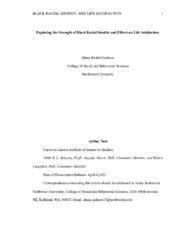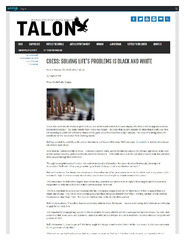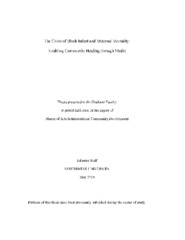Exploring the Strength of Black Racial Identity and Effects on Life Satisfaction
Abstract
Black racial identification is multifaceted and does not happen overnight, but rather, emerges over a lifetime. The U.S. Black community shares a reality of historical enslavement that included loss of their family name or tribe, no personal freedoms including economic, social, political, as well as over their physical body. One major question this research has uncovered is, how can a Black individual form an individual identity that is not tied to slavery and oppression? There is a gap in literature and research findings on the adverse effects of strong adherence to Black racial identity and the psychological effect of aligning with the Black community, whose history has been ladened with trauma and struggle. This present study used a quantitative method comparison and cross-sectional design using survey methodology to measure and compare the strength of Black identity and life satisfaction. The first hypothesis was that there would be a negative association between life satisfaction and a higher endorsement of Black identity (Centrality subscale). The second hypothesis was that the nationalist ideology would be positively correlated with life satisfaction. Finally, the third hypothesis was that the oppressive ideology would be negatively correlated with life satisfaction. The total participants consisted of 67 individuals who identified as having Black ethnicity. The results revealed that there was a statistically significant impact on reported satisfaction of life with higher adherence to Black identity subscale of Oppressed Minority. However, there were no significant correlations between Black identity subscales of Nationalist and Centrality and life satisfaction. These results indicated that Black individuals with prominent levels in the Oppressed Minority subscale highly identify with current and historical discrimination, oppression, and racial trauma. They also identify with other minority groups and find alliances with other oppressed groups, which reflect lower reports of life satisfaction.
Original item type
PDF
Original extent
76 pages
Subject
Collections
Copyright
This original work is protected by copyright. Copyright is retained by the author(s). Works may be viewed, downloaded, or printed, but not reproduced or distributed without author(s) permission.
Related items
Showing items related by title, author, creator and subject.
-
Black Racial Identity and the Expression of African Cultural Values: A Convergent Mixed Methods Study
Holloway, Christine Louise
Northwest University, 2024
142 pagesDespite decades of research on Black racial identity and African cultural values, there has been a lack of research that integrates the two topics using a mixed methods approach. Thus, using a convergent mixed methods ... -
Chess: Solving Life's Problems is Black and White
Vichot, Cayla
Northwest University, March 23, 2015
1 page -
The Crisis of Black Infant and Maternal Mortality: Enabling Community Healing through Media
Wolf, Johanna
Northwest University, May 2019
53 pages





 Maintained by the Northwest University Library
Maintained by the Northwest University Library